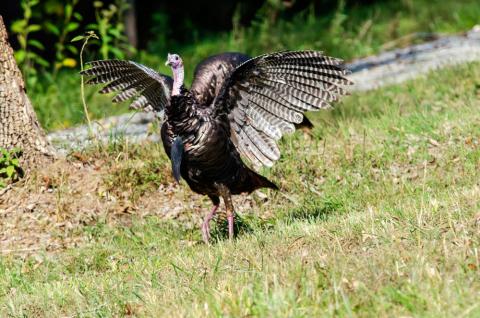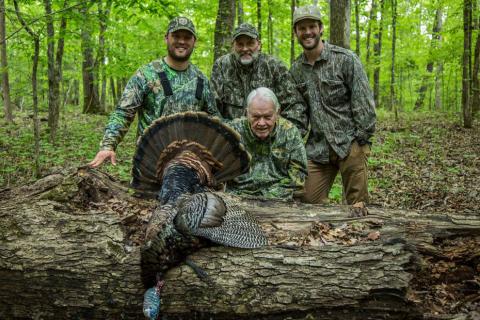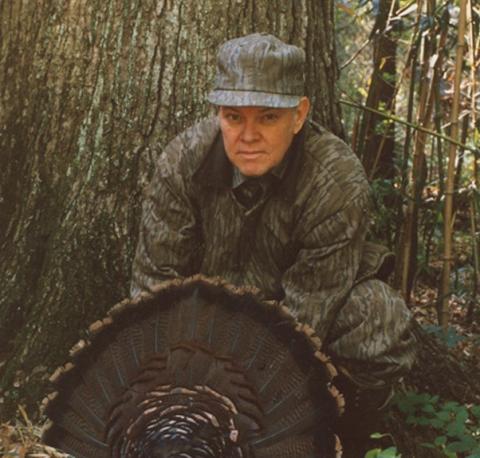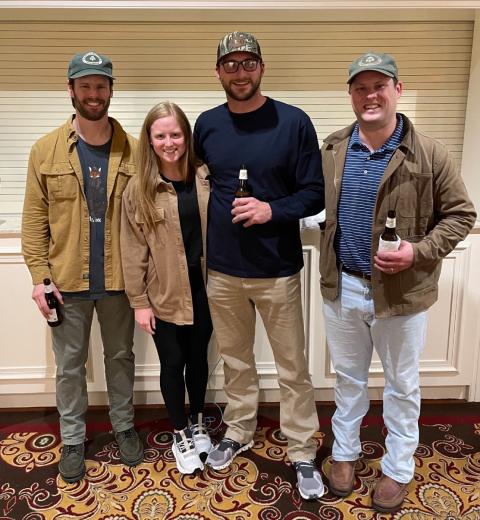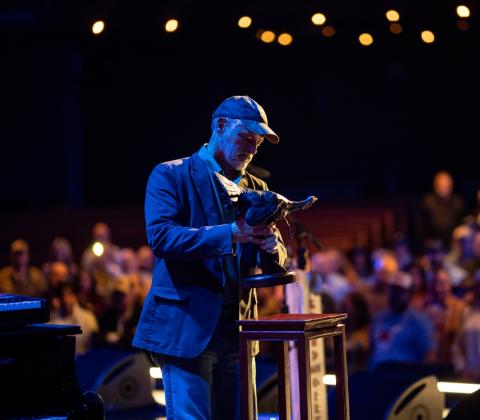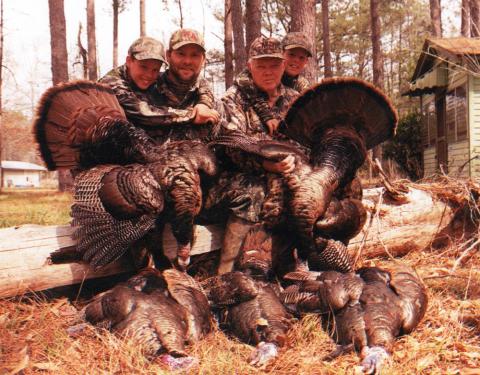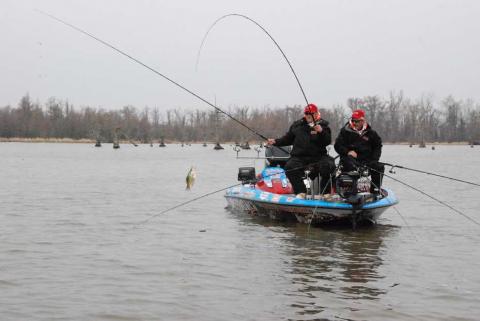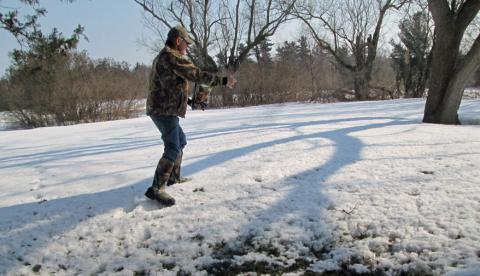provided by John E. Phillips
Mossy Oak Fishing Team member Bill Lowen from Brookfield, Indiana, has been fishing professionally for 14 years. On March 23, 2021, Lowen won the Bassmaster’s Pickwick Lake Elite Series tournament. “I’ve always fished the Bassmaster circuit once I turned pro,” Lowen said. Lowen is known on the Bassmaster circuit as “Dollar Bill,” because his objective in every tournament he fishes is to earn a check to take care of his expenses and his family. Lowen’s first concern is catching a limit of bass that he believes will earn him a check at the end of the tournament. Once he accomplishes that goal, then he tries to increase the weight of his five-fish limit. With a field of 100 other anglers, Lowen went for the win at Pickwick and took this win and a check for $100,000.
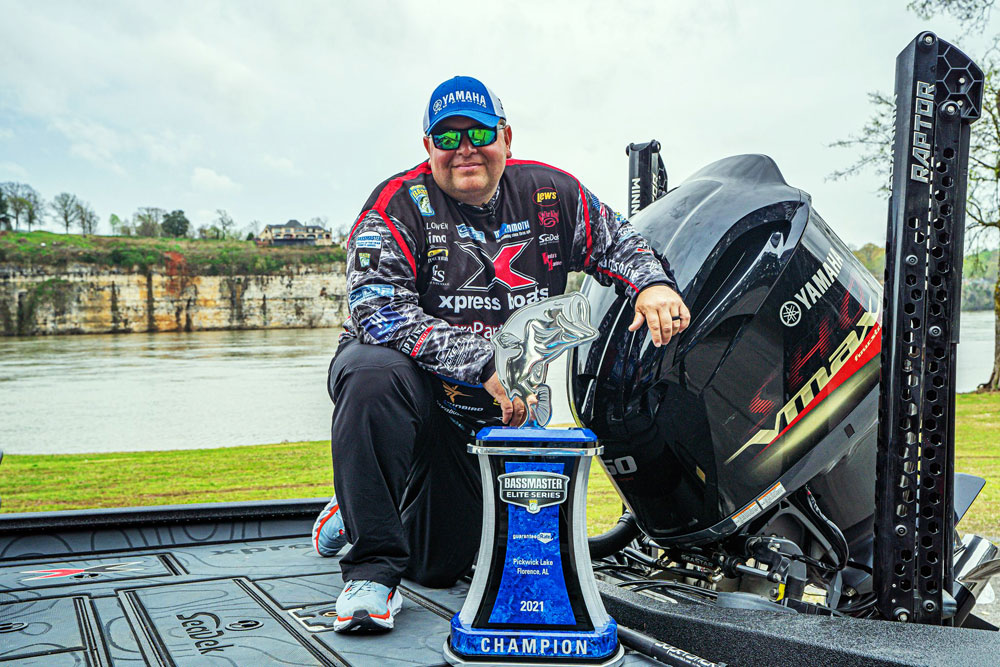
Bill Lowen’s Winning Bass-Fishing Strategy and Tackle
Pickwick Lake on the Alabama/Tennessee/Mississippi border wasn’t the kind of lake on which I typically fished well. The lake was down about a foot below winter pool, which meant it was about 7 feet lower than normal. I’m typically a shallow-water fisherman, and with the lake low, I knew that most of the bass probably would be in deep water. However, storms came in before the tournament, and the lake began to fill up, came up about 7-8 feet and almost reached flood stage. Under those conditions, there was much more shallow water available than there had been in our practice days. The lake transitioned into the kind of lake I liked to fish.
My favorite way to fish is with a flipping rod with a jig tied onto the end of my line and flipping shallow-water cover. Pickwick is a great lake to fish because it homes largemouth, smallmouth and spotted bass. I decided that most of the smallmouth in the lake would be up close to the dam or holding on underwater humps and ledges - not really how I liked to fish. I knew the spotted bass were usually smaller than the largemouths, so I decided to fish exclusively for largemouths in water 2-6 foot deep. I was using a 7’6” Lew’s custom rod and a Lew’s Team Lite reel 7.5:1 gear ratio on 20-pound test Seaguar fluorocarbon line. The lure that got me the most bites and put most of the bass I weighed in that went into my live well was my signature black-and-blue jig from Lure Parts Online. I liked this jig because the head of the jig had the weight forward, so it fell straight down and included a stout hook and a great weed guard.
I tried to keep my jig color as simple as possible. Since the water was highly stained after all the rain that had come into the lake, under those conditions, I preferred to fish either green-pumpkin or black-and-blue jigs. I chose to fish a black-and-blue jig with a little bit of tinsel in it to give it some flash. I learned there were plenty of bass in the area that I was fishing before the flood, so I knew those bass probably wouldn’t make a dramatic change of location because of the flood, but wouldn’t be holding in that same area. I had to figure out where they had moved to when the flood hit. I was fishing an island in the middle of the lake called Koger Island that was south of where the Natchez Trace bridge crossed the Tennessee River.
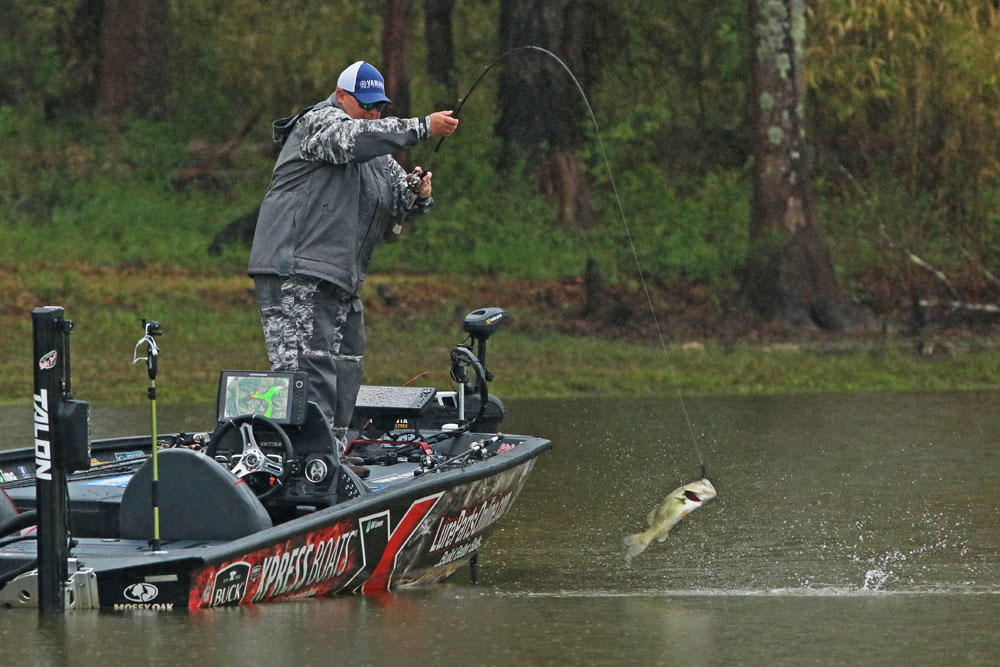
Bill Lowen’s Bass-Fishing Pattern for High, Muddy, Springtime Water
On the first day of the March, 2021, Pickwick Lake competition, I ran to Koger Island to see what effect the flood had had on the island. I saw that the water was dirty with lots of debris around the island. The back side of the island had numerous laydowns (trees that had fallen into the water). I thought that the bass probably had moved up into those fallen trees once the flood hit. I started flipping, and the first tree I came to, I got a bite. But I missed the bass. The second tree I fished, I caught a keeper bass. In a very short time, I had a limit of bass that I thought would earn me a check. So, I just continued to fish to try and improve my weight of bass and get a bigger check at the end of the tournament.
Every day I fished this Pickwick Lake tournament, the bass often would be on a different part of the underwater trees than they’d been holding on the day before. Once I was able to decide what part of the tree the bass were on, I could fish each tree and continue to get a bite in the same area of the trees where I’d caught the other bass in that day. Some days the bass would be on what I call the “heart” of the tree - the biggest portion of the tree. On another day, the bass moved out to deeper water on the very end branches of the tree.
On the third day, the water started to fall. I didn’t get many big bites, but all the fish I caught were about 3-1/2 pounds. I stayed with my flipping underwater fallen trees the first day, and I weighed in 21 pounds, putting me in third place. Brandon Palaniuk, another Mossy Oak Fishing Team member, was up there in either the top 5 or the top 10. I didn’t really expect to win, although I was really close to the leader. I’d been in the top 5 before and didn’t win the tournament. My game plan for the second day was to run the same pattern and see what happened.
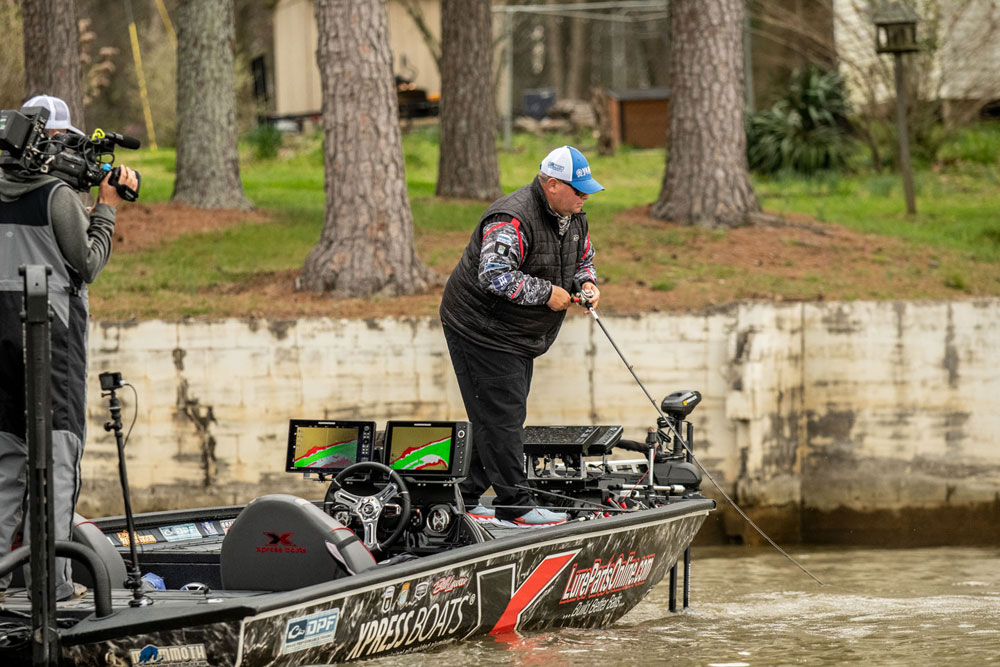
Looking for Bigger Bass on Different Types of Cover at Pickwick
The island I was fishing was about a half mile long. I was fishing on the inside of Koger Island, and on the outside of the island was where Brandon Palaniuk was fishing. We pretty much divided the island between the two of us. My side of the island had more blown-down trees on it, and Palaniuk’s side had more rocks in it. But both sides had about the same type of current running through them. Brandon concentrated on fishing the current streams on his side of the island, and I concentrated my fishing on the blown-down trees.
On the second day, the bass had moved out to the bushy ends of the trees on my side of the island. I’d fish the entire length of the tree until I caught a bass. Once I caught a bass or got a bite, I’d know which part of the tree I needed to fish. Just about all the bass holding in the trees would be in the same sections of the tree. I caught 23 pounds of bass on the second day.
One of the questions I was asked by the press was, “How are you getting those bass out of those tree limbs fishing only 25-pound-test line?” I explained that I set the hook hard and then held on tight and let the bass come out of the tree limbs themselves. Another question I was asked was, “What time of day did you catch the most bass?” Although every day was a little different, consistently I’d catch the most bass and often my limit, during the first three hours of the day. Then I’d practice. I’d go to some weedy places and other spots where I thought a big bass might be that would increase the weight of my limit. I caught some good bass that weighed almost 5-pounds each. When I went to the weigh-in, I was in second place. Another question I was asked then was, “Bill, you’re in second place. Do you think you’ve got a good chance to win?” My answer was, “Not at all. I’ve been in second place several times, and I haven’t won.”
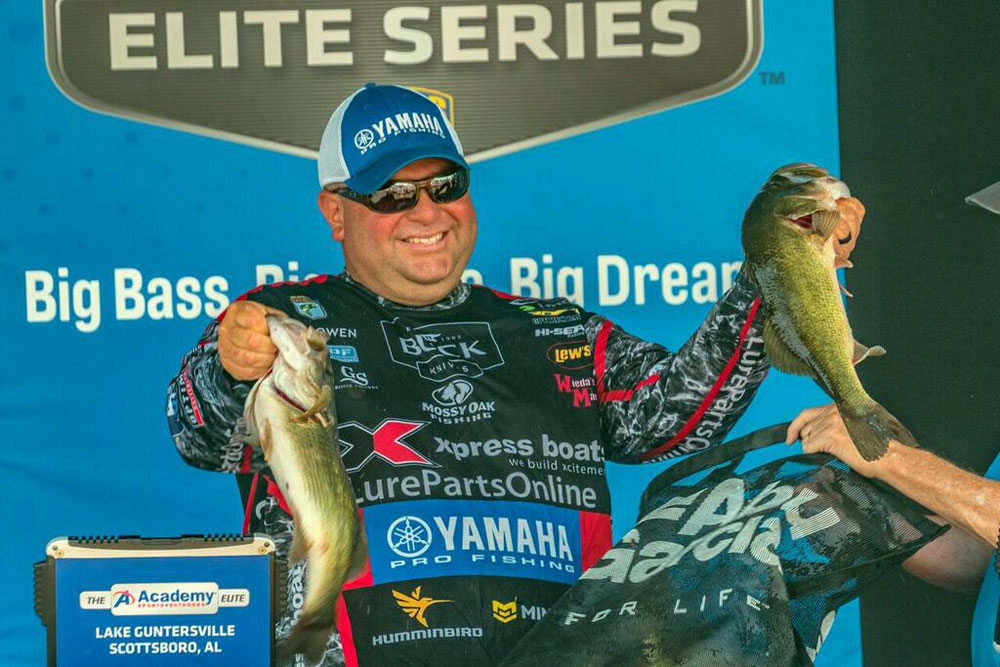
Bass Fishing Is a Changing Game Every Day
The third day of competition at Pickwick Lake was a repeat of the first two days, but I didn’t really get any big bites. I caught 3-1/2 pounders all day long and weighed in 17-1/2 pounds. I think the reason I didn’t get any big bites was the water started falling, and the bass moved out to the ends of the trees. However, I stayed with the same jig and same rod, reel and line that I’d used the first two days. The deepest part of the trees where the bass were holding that day was only 3-4 feet deep water. I really had to slow down my fishing and pick the cover apart. I caught a large number of short bass and only about 10 keeper bass. On this third day, I was tied for first place with Chad Pipkens. I was asked after the weigh-in, “Do you think anybody can catch you and Pipkens and weigh in more bass than you do on the last day?” I thought they might.
In a tournament like this, on a lake that has as many big bass as Pickwick does, someone could locate a school of very big bass or catch one kicker bass and take the win and the money home. Chad and I both had 62 or 63 pounds total on the next-to-the-last day of the tournament. Although that was a pretty good weight, if another angler got on a school of big bass or caught one huge fish, he would win it. Pickens and I would be the bridesmaids.
Bass fishing is a constantly changing event. The water levels, the color of the water and/or the depth of the water can change every day. The cloud coverage may alter, the wind direction may switch, and/or the bass, for no reason at all, can leave the places you’ve been catching them and move elsewhere. That’s what happened to Pickwick Lake on the night before the final day of this March, 2021 competition. The lake dropped 2 feet, and much of the underwater portion of the trees that I was fishing and catching bass on was now above water. Many of the places where I’d caught bass during the tournament were then dry ground.
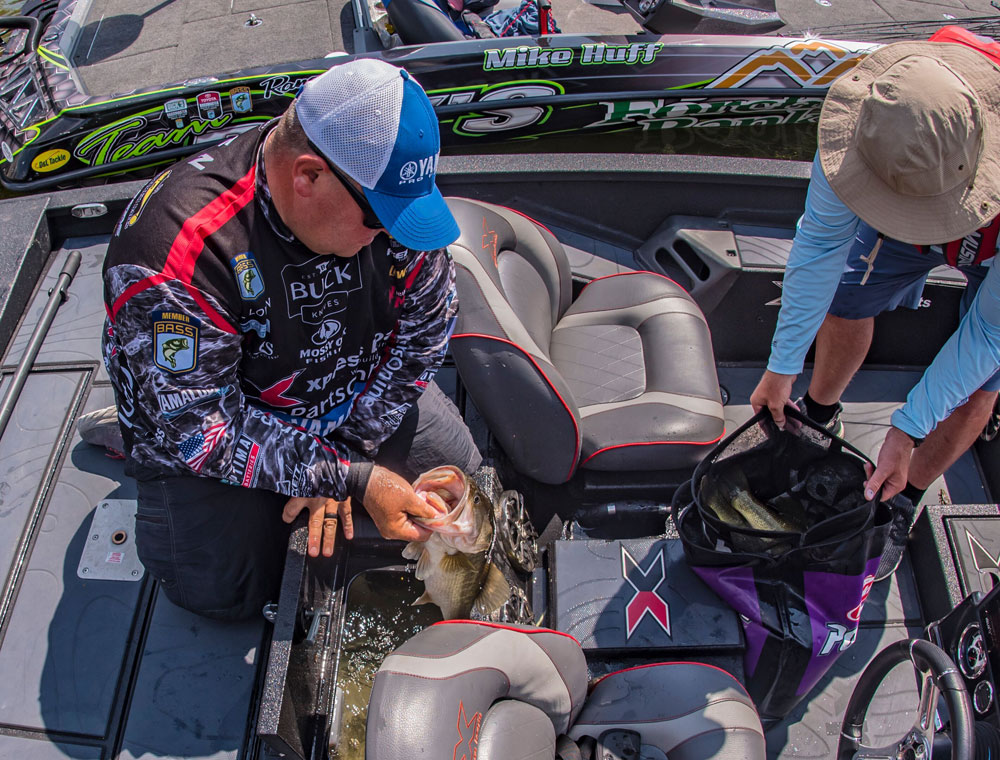
Bill Lowen Knew When to Fold ‘Em
As I mentioned, the water in Pickwick Lake went down 2 feet overnight, and a good portion of the trees where I’d been catching bass were now underwater. On this last day of the tournament, I went back to those trees, fished for about 30-40 minutes and didn’t get a bite. I knew from my experiences at previous tournaments that the time had come to fold up my island, tree fishing and go look for bass in other places. I knew the bass couldn’t remain in the trees after the lake had fallen 2 feet. I decided I had to move to deeper water to attempt to locate some bass holding on deeper cover.
I went to a section of the lake with deeper water and some docks. I got a couple of bites quickly and began fishing the docks. A question I was asked after the weigh-in was, “How did you mentally make that change to leave the region that had put you in first place, after only about 30-40 minutes of fishing there?” That island had been good and most people would have stayed with the pattern that moved them into first place. Why did I leave that spot? I think if I’m really honest, leaving the island was a very difficult decision for me. The island and the trees around the island had put me in first place. But I grew up at home fishing the Ohio River and had fished it for 30 years. I’d faced these kinds of situations many times on the Ohio River, so I understood what I needed to do once the water fell 2 feet.
Besides the docks, I knew there were some deep trees and bluff swings that fell off into the deep water. Also, I trusted my Humminbird 360. I had caught some keeper bass off some isolated cover around the islands. I felt that if I could pinpoint the cover and see the bass in those deeper water areas, I’d have a good chance of catching them. However, if I hadn’t used my Humminbird 360, I’d never have known the cover was there, or that the bass were holding there.
Another advantage of my Humminbird depth finder was I had LakeMaster mapping. I could see where the deeper water was and how to get to that deeper water. I could pinpoint the deep water and the structure that I’d found in that deep water. I decided to fish the same jig I’d used to catch the bass on the trees off the island, but went to a ½-ounce jig from a 3/8-ounce jig. I wanted to make sure that the jig was heavy enough to get my bait all the way down to the bottom, even in the current. So, I used a 1/2-ounce jig. The last day was miserable for me; I didn’t catch very many bass on that last day. I caught about six or seven keeper bass, and a couple of short bass. I thought I had about 18-19 pounds to go to the take out to weigh-in, but not enough weight to win. I thought I needed one more good bass. I was lucky enough to catch a bass that weighed 8 pounds, 5 ounces - the last fish I caught before I had to return to the launch site.
I was very nervous going to the scales and thought I might be the only angler who puked into his live well before he went to the weigh-in stand. To make matters worse, I was the last angler. Ryan Mosely was leading the tournament when I weighed in with his 22 pounds. All the other competitors and judges knew that I had to have 18 pounds, 2 ounces to win.
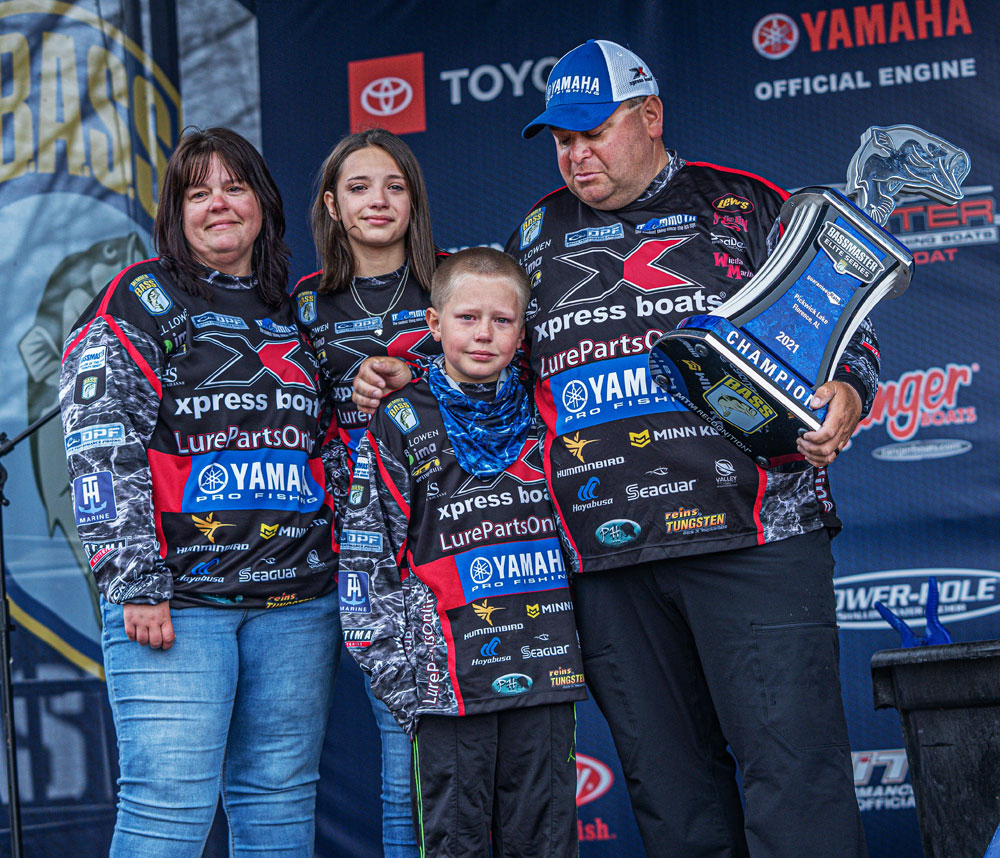
I took my two bags of fish to the scales at the same time. I had my 8-plus pounder in one bag, and my four other bass in a different bag. Then, just before I arrived at the weigh-in scales, the judges put my 8-plus pounder in the bag with my other four bass. I then put my bag under the water to give the fish a little breathing room. I thought to myself, “Oh, my goodness! This bag feels like it weighs 20 pounds.” My fish on the scales later weighed 20 pounds, 5 ounces.
In the back of my mind, I thought I’d be very busy if I won the event, but I just didn’t realize how many people would want to talk to me, and how busy I’d be after winning at Pickwick Lake. I received numerous messages from my fans, and did a lot of interviews. This experience of winning had been so overwhelming that I really hadn’t allowed myself to think about what I’d done. This tournament was the first Elite Series one I’d ever won. When asked what I planned to do with the $100,000, I said I’d cash that check, put the money in a jar and bury it out in the woods.
















